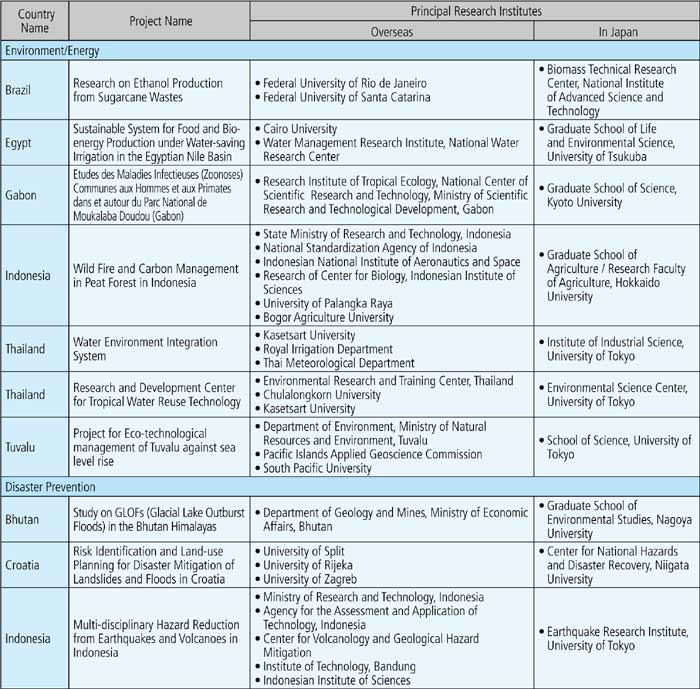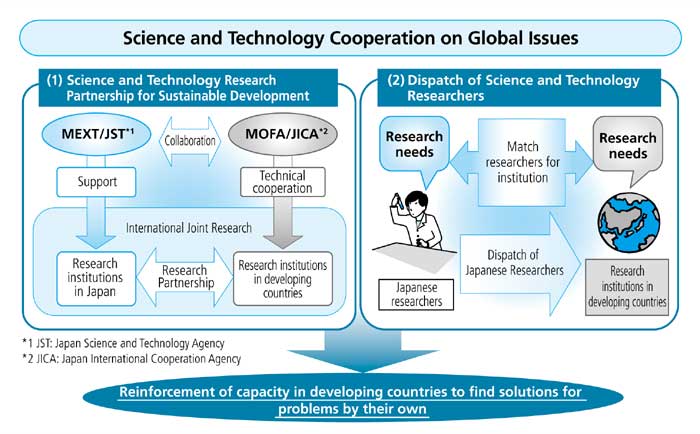Japan's Official Development Assistance White Paper 2008
In April 2008, the Ministry of Foreign Affairs (MOFA) and the Ministry of Education, Culture, Sports, Science and Technology (MEXT) established a new framework for international cooperation entitled "Science and Technology Cooperation on Global Issues." Under this framework, universities, research institutes, and other research-oriented organizations in Japan and developing countries conduct joint scientific research with a view to technical development and practical application, as well as the acquisition of new knowledge.
Global issues in areas including the environment, energy, natural disaster prevention, and infectious diseases control cannot be solved by Japan alone. The solution requires cooperation with the international community including developing countries. Japan has therefore established new programs under the above framework aimed at overcoming these issues to operate scientific and technical research and dispatch researchers. They basically cover countries that are subject to receiving Japan's ODA, mainly in Asia and Africa.
Science and Technology Research Partnership for Sustainable Development
This program, established in 2008, becomes a new form of technical cooperation provided by the Japan International Cooperation Agency (JICA). Projects through this program promote joint research between Japan and developing countries in fields including the environment, energy, natural disaster prevention, and infectious diseases control through joint assistance of JICA and the Japan Science and Technology Agency (JST), which is directed toward research institutions on both sides. Another objective of this program is to build developing countries' human resources at universities and other research institutes through performing joint research. To carry out the joint research with developing countries, JICA executes technical cooperation that combines the dispatch of researchers from Japan, the acceptance of trainees from developing countries, and the provision of equipment to developing countries. Meanwhile, JST selects joint research proposals submitted by research institutes throughout Japan and shoulders the research expenses in Japan.
Since the beginning of FY2008, MOFA and JICA have approached the governments of developing countries and have worked to ascertain their local needs. Meanwhile, MEXT and JST have solicited joint research proposals from Japanese universities and research institutes. As a result, 12 projects were chosen for this program in September 2008.
Projects Selected in FY 2008 (Scientific and Technical Cooperation)


Dispatch of Science and Technology Researchers
This form of Japan's ODA involves the dispatch of Japanese outstanding researchers to developing countries as JICA experts, who jointly conduct research at local universities and research institutes in fields including the environment, energy, disaster prevention, and infectious diseases control. This process enables these institutions to improve the research capabilities in developing countries. As well, successful performance on the research requires the needs and interests of research institutes in developing countries matched with the ones by Japanese researchers. Therefore, to facilitate appropriate matching, the Japan Society for the Promotion of Science compiles a database that combines the needs and interests of both Japanese researchers and the research institutes overseas ascertained by MOFA and JICA.



 Next Page
Next Page